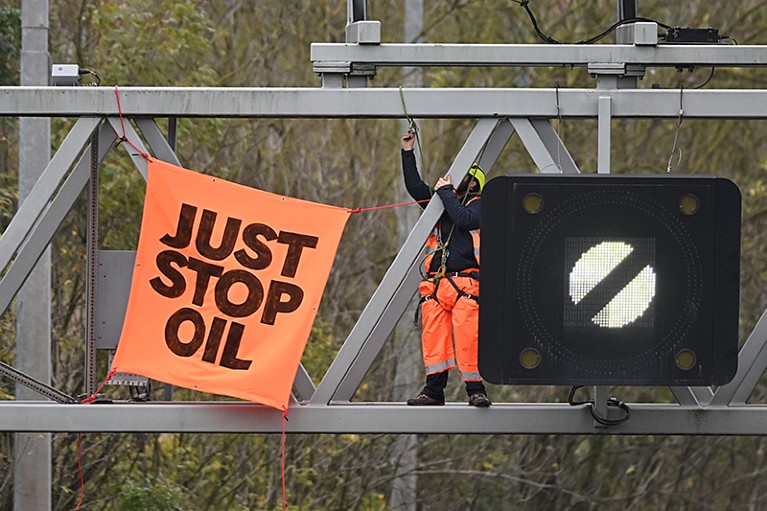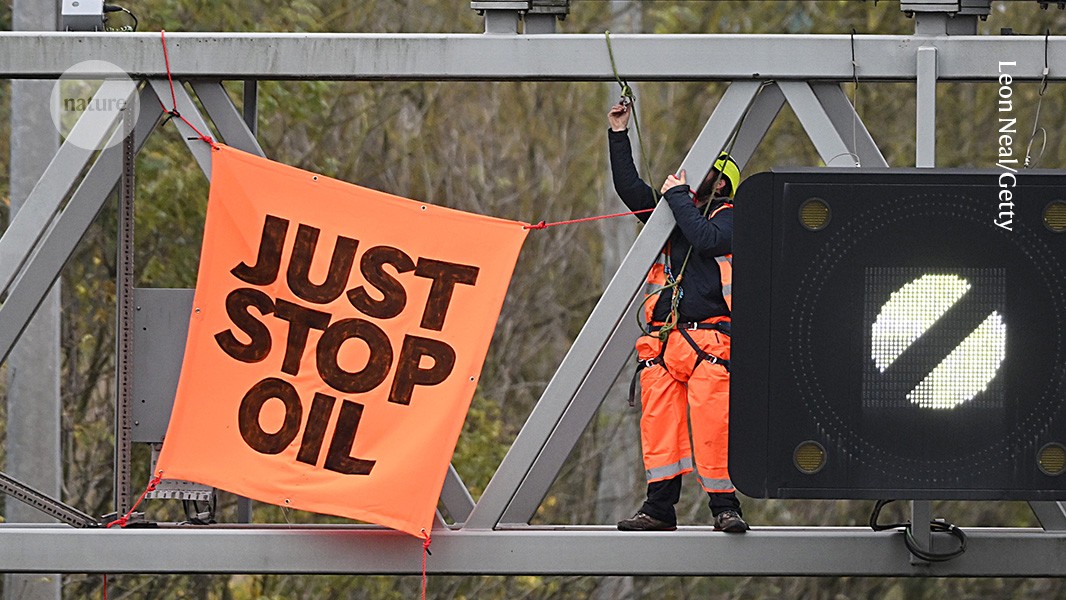
A Just Stop Oil activist hoists a banner during the group’s blockade of the M25 motorway, some sections of which carry more than 200,000 vehicles per day.
Credit: Leon Neal/Getty
Disruptive and high-profile climate protestors
can raise public support for conventional environmental groups, according to an unprecedented study that capitalized on activists’ closure of the United Kingdom’s busiest motorway.
The study is the first to use the public’s real-time response to an actual protest to test the
‘radical flank effect’, which proposes that the subversive fringe of a movement can make mainstream activists seem more reasonable
. Many activists think the effect is real. But until now, social scientists have assessed the hypothesis only by using surveys presenting artificial scenarios or by examining past examples, such as the effects on funding of the US civil rights movement.
“The debate about the effects of disruptive protests has very largely been driven by people’s intuitions and gut feelings,” says Markus Ostarek, a co-author of the study and the research director at the Social Change Lab, a non-profit organization in Cardiff, UK, that studies activism. The results were published today in
Nature Sustainability
1
.
Traffic standstill
In 2022, activists from the UK-based climate-action group Just Stop Oil forced the closure of London’s M25 motorway for four days. Before doing so, the activists told staff at the Social Change Lab about their plans so that the research team could survey UK residents before and after the campaign.
The researchers polled 1,415 people about their support for Friends of the Earth — an environmental group that favours more mainstream tactics such as lobbying and filing lawsuits — as well as their support for government climate policies. After the protests, the percentage of respondents who said they at least somewhat supported Friends of the Earth was 3.3% higher than before the highway blockage.
Why young climate activists have captured the world’s attention
The boost in support for Friends of the Earth was “modest”, but the findings are potentially “quite relevant and actionable”, Ostarek says. When disruptive protests occur, moderate groups can “use these moments of high momentum to directly negotiate with policymakers”, he says.
However, the researchers did not find a statistically significant effect on support for climate-friendly proposals, such as an end to the UK government’s exploration of
new fossil-fuel sources
.
Eric Shuman, a social psychologist at New York University in New York City, says the study is valuable because it shows that “the effects that we’re seeing when we do experiments line up with what we get in reality”. He and his colleagues tested the radical flank effect by surveying people who were shown fictitious news articles about violent and non-violent protests. They measured greater support for the moderate environmental group when a more rebellious group was presented in contrast
2
.
But other studies have indicated that
disruptive protests can decrease support
for an overall movement
3
. Although more studies are needed to evaluate the idea, attention-grabbing protests “can increase the size and power of the moderate group”, Shuman says.



